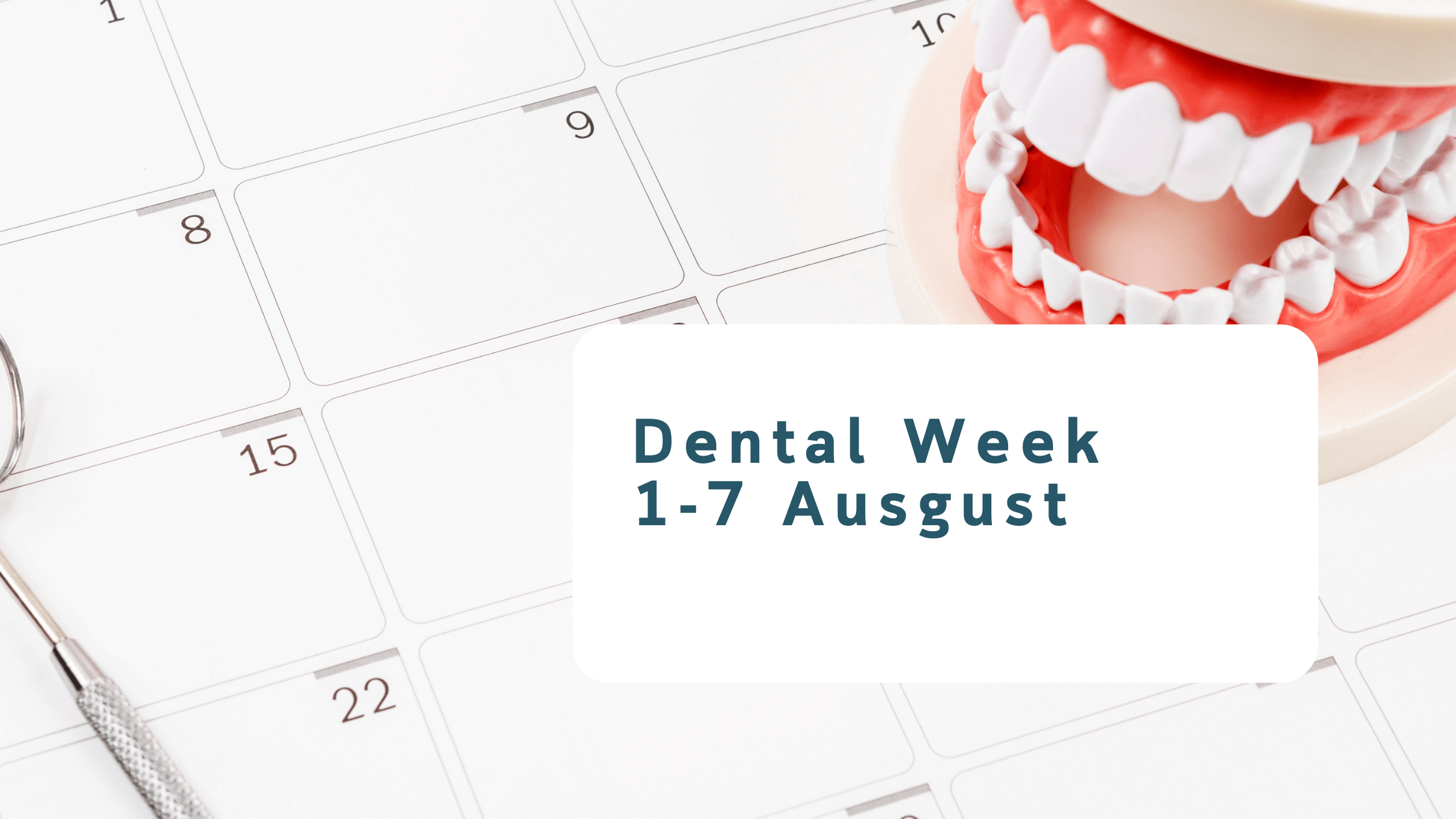Dental Health Week
7-13 August
Dental Health Week (DHW) is the Australian Dental Association’s (ADA) major annual oral health campaign. The campaign focuses on the importance of taking steps to care for your teeth and gums to help you keep your teeth and smile for life. - Teeth.org.au
Australian Dental Association looks at the connection between oral and general health.
6 Chronic conditions linked to oral health:
Heart Disease
Diabetes
Alzheimer's Disease
Adverse Pregnancy Outcomes - This will not be discussed in this blog, for more information click here.
Lung Conditions
Inflammatory Bowel Disease
Did you know -
Oral health and dental care in Australia
Almost half of the Australian population has one or more chronic diseases.
A 2021 study out of JCU determined that 70% of patients with major systemic conditions had poor knowledge of the relationship between their conditions and oral health.
Around 1 in 3 (33%) who needed to see a dental professional delayed seeing or did not see one at least once in the previous 12 months – and around 1 in 6 (16%) reported that cost was a reason for delaying or not seeing a dental professional.
As well as visits to dental professionals, there were close to 83,000 hospitalisations for dental conditions that potentially could have been prevented with earlier treatment in 2020–21.
Heart disease
Cardiovascular disease (CVD) are serious heart conditions that have caused 25% of all deaths in 2019 in Australia. and accounting for 25% of all deaths in Australia in 2021.2 CVD is highly preventable through health risk behaviour modification and pharmacotherapy.
Infection in the Heart’s Valves
People with heart valve disease are particularly at risk when gum disease is present, Dr. Ambrose says.
“The bacteria that live in your mouth when you have gum disease can cross into your bloodstream, enter the heart, and directly infect the vulnerable heart valves,” she says. “That’s especially concerning in our patients who have artificial heart valves.”
Infections in the bloodstream, especially those that affect the heart valves, need immediate attention from a cardiologist. - Penn Medicine
Brushing your teeth can cause bacteria to travel into the bloodstream. The bacteria going to the heart can be reduced by controlling the bacteria level in the mouth and reducing disease in the mouth.
A study was done in Finland ’To examine the role of chronic bacterial infections as risk factors for the disease the association between poor dental health and acute myocardial infarction was investigated.’
The outcome they found was that periodontal disease is more common among patients with acute myocardial infarction than among controls matched for age and sex.
To prevent unwanted bacteria in the mouth, brush your teeth twice a day and floss once a day.
Ensure that you see your dentist for a clean and general checks to prevent mouth infections affecting the heart.
2. Diabetes
One wouldn’t think about the mouth when thinking about diabetes. Diabetes increases the risk of developing gum disease and gum disease can negatively affect blood glucose levels.
Other mouth issues include:
Gum disease
Tooth decay
Decrease saliva production causing dry mouth
Slow healing sores in the mouth
Yeast or fungal infections
‘The loss of bone and gums surrounding affected teeth can lead to exposure of the root surface of the teeth. This surface is not as strong or resistant as the tooth enamel covering the crown. This combined with a decrease in saliva production, a common complication, increases a patient’s risk of developing dental decay affecting the tooth root surface, known as root caries.’ Teeth.org.au
Diabetics should have regular dental checks, especially if their diabetes is not well controlled or if they are newly diagnosed.
For more information, click here.
3. Alzheimer's Disease
‘The presence of periodontal pathogens can travel to the brain, trigger an inflammatory response, and contribute to neurodegenerative processes.’ - Australian Dental Association
‘Alzheimer’s disease is the most common form of dementia affecting 1 in 10 Australians over the age of 65.
There are studies demonstrating a link between diseases in the mouth and Alzheimer’s disease.’
Just as plaque from the mouth can travel in the bloodstream to affect the heart, ‘certain bacteria in gum disease have been found travelling to sites of the brain responsible for memory.’
For people that do have dementia or cognitive decline, it can be difficult to take care of their mouth and health. It is still important to try and have dental checkups as sometimes it may be difficult for patients with these diseases to communicate that they are in pain. Dentists can help find methods to make oral hygiene easier and help with regular professional cleans to manage inflammation in the gums.
It is important to have regular dental check ups to monitor and stabilize any diseases in the mouth. Remember to brush twice a day and floss once a day to maintain good oral hygiene and reduce the risk of developing gum diseases. It is also important to remain active, eat a balanced and nutritious diet and visit your general practitioner for regular general health checkups.
4. Adverse Pregnancy Outcomes
This will not be discussed in this blog, for more information click here.
5. Lung conditions
The aspiration of oral bacteria into the respiratory tract, potentially causes or exacerbates lung infections and inflammation. - Australian Dental Association
A ‘Systematic review of the association between respiratory diseases and oral health,’ resulted in that ‘There is good evidence that improved oral hygiene and frequent professional oral health care reduces the progression or occurrence of respiratory diseases among high-risk elderly adults living in nursing homes and especially those in intensive care units.’
6. Inflammatory bowel disease
Oral Microbiota and Systemic Health: New Insights and Ongoing Education
Emerging research suggests that dysbiosis of oral microbiota may contribute to gut inflammation and exacerbate inflammatory bowel disease (IBD).
The academic community recognises the common thread of inflammation and is integrating this knowledge into the education of future dental professionals.
Professor Ivan Darby, head of periodontics at the Melbourne Dental School and editor of the Australian Dental Journal, states:
Systemic Interactions: Dental students are taught about the systemic interactions of oral health, particularly focusing on diabetes, pregnancy, obesity, cardiovascular issues, diabetes, rheumatoid arthritis, and mental health. These conditions share an underlying inflammatory component.
Research Links: Published research links the bacteria causing periodontal disease to various systemic diseases, including Alzheimer's disease, cardiovascular disease, and rheumatoid arthritis. This bacteria species has been found in the brain, fatty plaques, amniotic fluid, and in the pathogenesis of rheumatoid arthritis.
Educational Lag: It typically takes 5-10 years for academic research to be incorporated into student curricula. Initial data on the link between cardiovascular disease and oral health dates back to the late 1980s and early 1990s.
Despite a recent decline in research papers on these subjects, Prof. Darby emphasises the importance of continuing to educate both practitioners and patients about the connections between oral health and systemic diseases.
To conclude, it's clear that maintaining good oral health is crucial not just for your teeth and gums, but for your overall well-being. Dental Health Week (DHW) is a vital campaign by the Australian Dental Association (ADA) that underscores the importance of taking care of your oral health to prevent chronic diseases and improve quality of life.
Key Takeaways:
Oral health is linked to various chronic conditions, including heart disease, diabetes, Alzheimer's disease, lung conditions, and inflammatory bowel disease.
Despite the well-documented connections, many Australians are unaware of how oral health impacts their general health.
Regular dental check-ups and early treatment can prevent serious health issues and reduce hospitalisations.
The ADA’s efforts during DHW aim to bridge this knowledge gap and encourage proactive dental care. By understanding and addressing the connections between oral and general health, we can all take steps towards a healthier future.
For more information on how to maintain your oral health and its impact on chronic conditions, visit Teeth.org.au.







